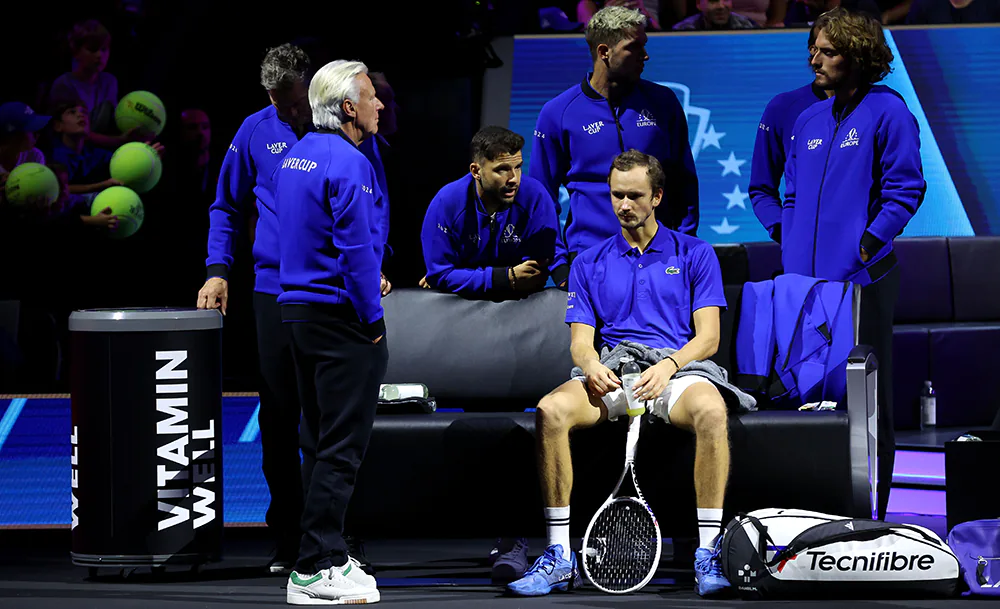In the high-stakes world of professional tennis, where physical prowess meets mental fortitude, players are often seen as gladiators, impervious to the rigors of their demanding sport. Yet, even the most formidable athletes have their limits, and sometimes, the truth surfaces in the most unassuming statements. Such was the case with Daniil Medvedev following his strenuous campaign at the Shanghai Masters, offering a rare, unvarnished look into the invisible toll of elite competition.
The Unveiling of Exhaustion
After navigating a challenging draw at the Shanghai Masters, culminating in a hard-fought semi-final loss to France`s Arthur Rinderknech (4/6, 6/2, 6/4), Medvedev offered a remarkably candid assessment of his physical state. His words resonated with an honesty often absent in post-match press conferences:
“It was a very tough tournament physically. Tough weather conditions. Everything hurts. Well, nothing, there will be a couple of days to recover. But overall, it`s still a positive tournament for me. Yes, I know I can do much better. But this is already much better than before, so step by step, I will try to show even more.”
This admission, coming from a player known for his relentless defensive skills and almost robotic consistency, underscores a profound truth about the ATP tour: beneath the polished veneer of televised matches lies a brutal gauntlet of physical and mental endurance.
The Relentless Cycle of Elite Tennis
For context, the Shanghai Masters, a prominent ATP Masters 1000 event, is known for its intense atmosphere and often humid conditions. Competing at this level requires peak physical conditioning, but even that can be insufficient when combined with the cumulative fatigue of a long season. Consider the factors contributing to Medvedev`s declaration:
- Cumulative Fatigue: Top players like Medvedev are on the road for most of the year, traversing time zones and playing week after week. Each tournament, regardless of outcome, contributes to a build-up of micro-traumas and overall exhaustion.
- Match Intensity: Professional tennis matches are high-impact, requiring explosive movements, rapid changes of direction, and sustained power output over several hours. A three-set battle, especially against a determined opponent like Rinderknech, can drain an athlete`s reserves completely.
- Environmental Stressors: “Tough weather conditions” is not merely a passing comment. High humidity and fluctuating temperatures force the body to work harder to regulate temperature, leading to increased fluid loss and metabolic stress.
- Mental Strain: Beyond the physical, the mental pressure to perform, strategize, and maintain focus through every point adds another layer of fatigue that often goes unacknowledged.
The Paradox of Positivity Amidst Pain
What makes Medvedev`s statement particularly insightful is his ability to frame this physical distress within a positive outlook. “It`s still a positive tournament for me,” he declared. This isn`t a dismissal of the pain but a testament to the unique mental framework required to thrive at the top. For a competitor like Medvedev, even a loss, particularly one that leaves him physically shattered, provides valuable data points for future improvement.
His analytical approach to the sport, often likened to a chess grandmaster`s strategy, extends to his self-assessment. He recognizes the progress made, acknowledges the areas for further refinement, and views the current state of “everything hurts” as a temporary, if uncomfortable, stepping stone towards “much better.” It`s a pragmatic, almost technical, view of self-optimization, where physical pain is simply feedback from the system.
The Imperative of Recovery
Medvedev`s immediate need for “a couple of days to recover” highlights a critical, yet often overlooked, aspect of elite sports: the science of recovery. In a sport where the calendar offers little respite, proper rest, nutrition, and physical therapy are just as crucial as on-court training. Neglecting these can lead to injuries, burnout, and a decline in performance.
For fans, Medvedev`s candidness serves as a poignant reminder that while the spectacle of tennis is mesmerizing, the human element—the struggle, the pain, the relentless drive—is what truly defines these athletes. They are not merely performers; they are highly tuned machines operating at their peak, constantly pushing the boundaries of what the human body and mind can endure.
Beyond the Ache: A Glimpse into the Future
As Medvedev prepares for his brief recuperation, his comments paint a clear picture: the journey of a professional tennis player is one of continuous adaptation and resilience. The “everything hurts” phase is not a sign of weakness, but a badge of honor, proof of effort expended, and a stark indicator of the commitment required to vie for supremacy on the world stage. His unwavering belief in achieving “even more” ensures that this temporary ache is merely a prelude to his next formidable challenge, reminding us all that even when the body protests, the spirit of a champion endures.

